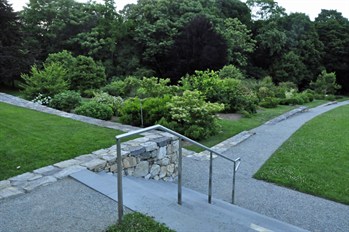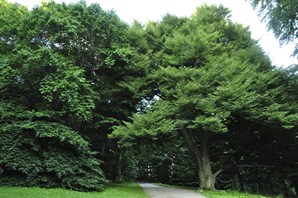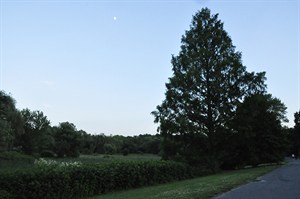On my trip out East I visited many wonderful gardens, public and
private, and they all thrill and amaze me. But there is something
different about my feelings when visiting Arnold Arboretum in the Boston area. It is one
of my 'temples', a place of beauty, memories of other visits
(like the time in 1993? Janet and I rode bikes around the Arb with
Dr. Michael Dirr trying to convince him
to come to Michigan in the winter to give a talk. He declined but
it was worth trip and gave us some lifelong memories of a time
spent with a lengend in his own time or when watching, with some
trepadation, as our children roller bladed down a hill at what we
considered a somewhat unsafe speed), and a since of reverance.
Arnold Arboretum is the oldest public arboretum in North
America. It's part of Boston's "Emerald Necklace", a chain of parks
that was designed Fredrick Law Olmstead. Olmstead, a designer of
parks for the people (Central Park in NYC, for instance), believed
that beautiful landscapes provide moral and spiritual sustenance.
At that time the director of The Arnold was Charles Sprague
Sargent, who was devoted to the scientific study of trees. Olmstead
and Sargent worked together in 1872 to combine their separate
visions on a 265 acre farm in the Jamica Plains area of Boston. The
park they created is open to the public year around and its
collection of living trees, shrubs, and woody vines is recognized
as one of the most comprehensive and best documented of its kind in
the world.


I arrived at The Arnold at 6 pm, time enough for a quick walk
through. The hardest decision I had is where to go. Should I go
look at some of the plant collections like the Leventritt Shrub
& Vine Garden to see how it's grown?




The thing is once I get into a collections like this I want to
take a picture of every plant there. The good thing about an
arboretum like The Arnold is that all of the plants have a tag.
I've found three major type of tags at Arnold. One of the types is
large, black with white letters, on trunks of prominent trees.

Another is a coppery color anodized aluminum tag that is on
every cataloged plant in the arboretum. This tag has a lot
of information on it that looks complicated but is really
simple.


Here is more information on this tag.
For you modern up to date smart phone users there are now tags
for you. 
However, I didn't have the time or the light to cover the vine
collection. In addition, the trees were calling for me to walk
among them. The loudest of the trees calling were the beeches; the
grand, wonderful beeches. I've learned over the last few years not
to ignore the trees (Thanks, Dan
Kurkowski. I hear them and you!). On the way I was in total awe
of the trees.

 oak,
oak,
 paper bark
maple,
paper bark
maple,
 spruce,
spruce,

 Kousa 'Summer Stars',
Kousa 'Summer Stars',
 weeping
Katsura,
weeping
Katsura,
 pine,
pine,
and then the beeches.

This is a mature grove of American beeches and European beech
cultivars. Walking underneath them and seeing their size, branching
and trunks is an experience that affects us all in different ways.
I have a sense of age, wisdom, regality and reverance.

 Tortulosa beech
Tortulosa beech
 cut leaf beech
cut leaf beech
Time to start heading back and out it's getting late and the
light is fading fast. On the way are more trees that inspire.
 Livingston hemlocks
Livingston hemlocks
 Kousa 'Snow Boy' and
Sargent hemlock
Kousa 'Snow Boy' and
Sargent hemlock
 golden rain tree
golden rain tree
 stewartia
stewartia
 dawn redwood
dawn redwood
As the moon rose and the sun set I reached the main gate area
bid adieu to one of the truly wonderful places to see and
experience. I'll be back!